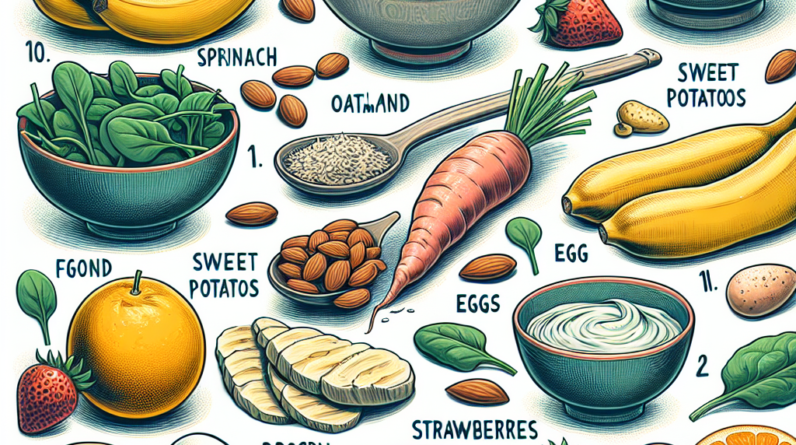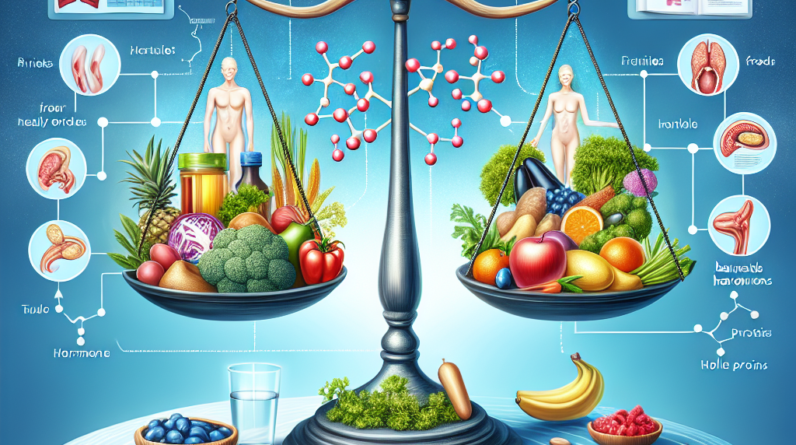
1. Essential Vitamins: The Unsung Heroes
The Role of Vitamins in Your Body
Let me tell you, vitamins are like the cool kids in the nutrient world – everyone knows they’re important, but not everyone understands just how crucial they really are. Each vitamin has its own unique role. For example, Vitamin C isn’t just about boosting your immune system; it also plays a significant role in collagen production, which is essential for your skin, joints, and overall health. Then there’s Vitamin D, the sunshine vitamin, which supports bone health and immune function. It’s amazing what these little compounds can do!
Get a Huge Discount and Bonus! Try for 90 Days Risk Free
I’ve noticed that often people overlook these essential nutrients because they think they can survive on the basics. Trust me, your body craves a variety of vitamins to keep things running smoothly. B vitamins, for instance, are key players in converting food into energy, and if you’re feeling sluggish, a boost in B vitamins might just do the trick!
Next time you whip up a meal, think about adding colorful vegetables and fruits. The brighter the color, the more vitamins they usually have inside. Imagine your plate looking like a rainbow – not only does it look good, but your body will thank you for it too!
Common Vitamin Deficiencies to Watch For
I’ve found that many of my friends and even some family members struggle with vitamin deficiencies without even knowing it. A common one is Vitamin D, especially during the winter months when sunlight is scarce. If you’re not getting enough, it can lead to feelings of fatigue and even mood swings.
Another deficiency I often hear about is Vitamin B12, particularly among vegetarians and vegans. This vitamin is primarily found in animal products, and a lack of it can lead to fatigue, weakness, and neurological issues. I always recommend talking to a doctor if you think you might be deficient.
So, how do you know what you need? A simple blood test can catch a lot of these deficiencies early on. And if you’re feeling off, don’t just ignore it—dig a little deeper. Your health is worth it!
Maximizing Your Vitamin Intake
Increasing your vitamin intake might seem daunting, but it doesn’t have to be! Start simple. Incorporate more whole foods into your diet – think fruits, veggies, nuts, and seeds. Instead of reaching for that bag of chips, why not munch on some carrot sticks with hummus? Your body will thank you!
Supplements can also fill the gaps. I personally take a multivitamin to ensure I’m covered, but it’s important to consult with a healthcare provider before starting any supplement regimen. Too much of a good thing can be harmful!
Lastly, cooking your meals can help you understand what nutrients you’re getting. I love trying new recipes and tracking how many different vitamins I’m incorporating. It’s like a fun little challenge to keep my health on track!
Get a Huge Discount and Bonus! Try for 90 Days Risk Free
2. Vital Minerals: A Foundation for Wellness
Importance of Minerals in Everyday Life
Minerals might not get as much attention as vitamins, but believe me, they’re essential for our overall health. Things like calcium, magnesium, and iron play pivotal roles. For example, we all know calcium for bone health, but did you know magnesium helps with muscle function and maintaining normal heart rhythm? It’s true!
I learned the hard way how important iron is when I discovered I was low on this mineral. It’s crucial for transporting oxygen in your blood, and I was feeling constantly tired until I boosted my levels. If you’re planning on being active, make sure you’re not skimping on minerals.
The cool thing about minerals is that they’re often found in the same foods that provide vitamins. Eating a well-rounded diet generally covers both bases, but being mindful about specific minerals can really enhance your diet.
Signs of Mineral Deficiencies
Now, you might be wondering how to tell if you’re deficient in certain minerals. Common signs for calcium deficiency include muscle cramps and brittle bones, while magnesium deficiency can lead to fatigue and muscle weakness. Don’t ignore these signs!
Need a Serious Energy BOOST? Huge Discount Try for 90 Days Risk Free
Another issue I’ve come across is potassium deficiency, especially when someone’s on a restrictive diet. Potassium helps regulate blood pressure and maintain proper muscle function. Symptoms might include muscle spasms and an irregular heartbeat, which can be pretty scary.
If anything feels off in your body, consider looking into your mineral intake. A holistic approach to health means addressing these issues head-on before they escalate!
Strategies for Getting More Minerals
Okay, so how do we up our mineral game? Start by eating a variety of foods! Greens like spinach and kale are not only rich in vitamins but also loaded with minerals. Almonds and sunflower seeds? They’re your friends too! I snack on these regularly for a nutritious boost.
Cooking methods matter too! Steaming your veggies can help retain minerals better than boiling. I love experimenting with different cooking styles to see how it affects not only taste but nutrient retention as well. It’s fun and educational!
Lastly, consider including some sea vegetables in your meals. Seaweed is packed with trace minerals, and it can add a unique flavor to dishes. I like adding it to soups or salads for an extra kick!
3. Healthy Fats: The Good Kind
The Role of Healthy Fats in Your Diet
When people hear “fats,” they often cringe, but I’m here to tell you that not all fats are created equal. Healthy fats, like those found in avocados, nuts, and fish, are crucial for brain health and hormone production. They give your body energy and help absorb fat-soluble vitamins A, D, E, and K.
Personally, I kickstart my day with a breakfast smoothie that includes avocado. It’s not only creamy and delicious but gives me the energy I need to tackle my day without a crash. Trust me, adding healthy fats can change your game!
So instead of cutting out fats completely, focus on incorporating good fats. They help with satiety too, meaning you’ll feel fuller longer. That’s a win-win in my book!
Identifying Sources of Healthy Fats
You may be wondering where to find these healthy fats. Look no further than olive oil, nuts, seeds, and fatty fish, like salmon. These foods are not only tasty but packed with omega-3 fatty acids, which are fantastic for heart and brain health.
With snacking, try swapping out your usual chips for a handful of nuts or some nut butter. I love spreading almond butter on my apple slices or toast. It’s a simple switch that makes a big difference in how I feel!
If you’re cooking, try using olive oil instead of butter. It’s a great ramp-up in flavor and health benefits – and it’s super easy! Just a few small changes can have a massive impact on your overall nutrient intake.
Incorporating Healthy Fats into Your Meal Plan
So now that you know about healthy fats, how do you incorporate them into your meals? Start by planning! I often sit down at the beginning of the week and plan out my meals, ensuring I’m including a source of healthy fats in each one.
Good Health Solution is Easier Than Most People Think!
Take a Look for Yourself!
It doesn’t have to be complicated either. A simple salad with mixed greens, cherry tomatoes, and some sliced avocado is an easy way to up your fat game. Or try making a homemade salad dressing with olive oil, vinegar, and spices – you’ll never want store-bought again!
Additionally, consider meal prepping on Sundays! Preparing meals in advance can guarantee that you have those healthy fats ready to go, as life can get busy and sometimes it’s easier to grab whatever is quick. Planning ensures you won’t skip out on what your body needs.
4. The Power of Fiber: Your Digestive Friendly Helper
Understanding Dietary Fiber
If you think fiber is boring, let me tell you – it’s actually a superstar nutrient! Fiber helps keep your digestive system running smoothly. It aids in weight management and reduces the risk of chronic diseases. If your digestion is off, fiber is your be-all-end-all buddy in getting things back on track.
There are two types of fiber: soluble and insoluble. Soluble fiber helps lower blood cholesterol and glucose levels, which is super important. Insoluble fiber, on the other hand, adds bulk to your stool and helps food pass through your digestive system more effectively. Trust me; your gut will thank you.
I often find that adding fiber-rich foods into my diet boosts my energy levels. It keeps me satisfied for longer and gives my digestive system a healthy rhythm!
Foods Rich in Fiber
Alright, so you’re probably wondering where to find this magical fiber. You can start with fruits, vegetables, legumes, and whole grains. Think berries, lentils, quinoa – each is packed with fiber and can easily fit into your meals.
When I’m snacking, I tend to grab some nuts or veggies instead of processed snacks. It’s incredible how just a little shift can make such a big difference. I like to keep baby carrots and hummus handy for an easy grab-and-go snack.
Also, don’t knock whole grains! Swapping white bread for whole grain can provide a significant fiber boost, and it’s often more filling. Plus, whole grains have more nutrients overall!
Tips to Increase Dietary Fiber
So, how do you ramp up your fiber intake? Start gradually! If you suddenly increase your fiber, it can lead to bloating and discomfort. I usually add in a little more fiber each day until I reach that sweet spot.
Experiment with recipes that focus on fiber-rich ingredients; for example, I love adding lentils to my salads or making a hearty vegetable stew loaded with beans. Not only is it satisfying, but it’s also a fun way to try new foods!
Lastly, remember to drink plenty of water. Fiber works best when it absorbs liquid, helping to keep everything flowing smoothly. I keep a water bottle with me all day to ensure I’m hydrating and feeling my best!
5. Hydration: The Key Nutrient Often Overlooked
The Importance of Staying Hydrated
Water is life, folks. And yet, it’s so easy to forget how vital hydration is for our bodies. Staying hydrated supports digestion, nutrient absorption, and even weight regulation. I’ve personally experienced how dehydration can zap my energy and affect my mood, which is why I prioritize my water intake daily.
It’s wild to think that even mild dehydration can impair physical performance. If you’re active, you definitely want to keep an eye on your hydration levels to enhance your workouts and daily activities.
I’ve found that if I have a water bottle with me, I’m much more likely to sip throughout the day. Making it accessible promotes consistent hydration without you even realizing it!
How to Assess Your Hydration Needs
One way to know if you’re drinking enough is to keep an eye on the color of your urine. If it’s light yellow, you’re likely well-hydrated. Darker yellow can mean it’s time to grab that water bottle. I’ve made it a little game where I see how long I can keep my urine color in the ideal range.
Another method is to set reminders. I often use my phone to alert me every hour to take a water break. It doesn’t have to be a huge drink – even just a few sips can be beneficial.
Listen to your body! Thirst is your biggest cue that it’s time to hydrate. Don’t ignore those signals and gulp down a glass. It’s your body’s way of asking for some TLC!
Fun and Flavorful Ways to Stay Hydrated
Water doesn’t have to be boring. I love infusing my water with fruits like lemons, strawberries, or cucumbers. It adds a refreshing twist, and it’s a great way to switch things up. You could even throw in herbs like mint for extra flavor!
Additionally, consider getting hydration from your foods! Many fruits and veggies have high water content, like watermelon and cucumbers. I actually enjoy making smoothies with these ingredients, knowing I’m not just hydrating but also fueling my body.
Lastly, if you’re not a huge fan of drinking plain water, herbal teas can be a fantastic alternative. They’re hydrating while providing their benefits, and that’s a pretty solid combo, if you ask me!
Frequently Asked Questions
1. What are the most common vitamin deficiencies?
Common vitamin deficiencies include Vitamin D, Vitamin B12, and Vitamin C. Regular check-ups and a balanced diet can help prevent these issues.
2. How can I ensure I’m getting enough minerals?
Eating a variety of whole foods, including fruits, vegetables, whole grains, nuts, and seeds, can help ensure a good mineral intake. A balanced diet is key!
3. Why are healthy fats important in my diet?
Healthy fats are essential as they support brain health, hormone production, and help absorb fat-soluble vitamins. They also keep you feeling full longer!
4. How can I add more fiber to my meals?
You can increase your fiber intake by including more fruits, vegetables, legumes, and whole grains in your diet. Start small and gradually add them in!
5. What are some tips for staying properly hydrated?
To stay hydrated, carry water with you, set reminders to drink, and consume water-rich foods like fruits and vegetables. Pay attention to your thirst signals!








